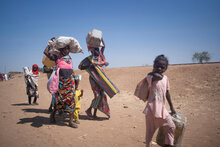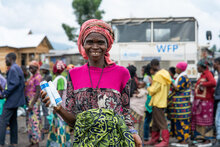European Union Supports Efforts To Reduce Malnutrition In Chad
“Thanks to the EU’s contribution of €5 million (3,28 billion CFA Francs) the participating UN agencies are on the path to reaching Sustainable Development Goal 2 – to achieve zero hunger by 2030,” said WFP Chad Country Director Mary-Ellen McGroarty. The EU Ambassador, head of European Delegation in Chad Denisa-Elena Ionete, is joining WFP to welcome the launch of this project: “We are delighted because this enables us to reinforce our efforts to fight malnutrition and support this initiative, which will create the first link in a chain of locally-produced fortified complementary food for children. Through this project,” she said, “the EU will be supporting the Chadian government’s strategy for the country’s development.”
The project will be piloted in Mayo-Kebbi East, Mayo-Kebbi West and Kanem regions. These Chadian regions are affected by chronic hunger, with levels of malnutrition either close to or surpassing WHO’s emergency threshold of 30 percent, though favourable conditions for good agricultural production exist.
All parties involved in the “Local production of complementary fortified food” project (PRO-FORT) will contribute to creating an environment which is conducive to promoting local production of quality food; to reinforcing production capacities and marketing of fortified food; to encouraging the uptake of better maternal and child nutrition practices; and to reducing malnutrition.
Chronic malnutrition has serious and sometimes irreversible consequences on their cognitive and physical growth, which continues into adulthood and considerably reduces their productivity, with a negative impact on productivity during adulthood. According to the Cost of Hunger Study in Chad (October 2016), 56 percent of the adult population suffered from stunting during their childhood.
“Improving infant and young child nutrition is a real challenge in Chad. To raise communities’ awareness, especially that of mothers, about the importance of adequate nutrition for infants and young children will be crucial to ensure optimal growth. That’s why promoting healthy nutritional practices is an essential component of and will contribute to the success of the project,” said Philippe Barragne-Bigot, UNICEF Representative in Chad. “UNICEF and its partners will support behavioural change communication campaigns and will promote the uptake of locally produced nutritious food.”
“This project also supports Chad’s National Nutrition and Food Policy and the National Investment Programme in the Rural Sector. To fight against malnutrition is one of FAO’s key goals. Through the local production of complementary fortified food, which adheres to quality international standards, we are delighted to improve access, availability and use of highly nutritious food for the most vulnerable, especially for young children,” said FAO Representative in Chad, Mohamadou Mansour N’Diaye.
This new project is a complement to the 11th European Development Fund, through which the EU will invest more than 100 billion CFA francs (€156 million) from 2016 until 2021 to improve efforts to combat chronic malnutrition.
# # #
For more information:
Nathalie Magnien, WFP Chad :
+235 66 99 30 40 I nathalie.magnien@wfp.org I www.wfp.org/countries/chad
Maria Fernandez, UNICEF Chad
+235 66 36 00 42 I mfernandez@unicef.org I www.unicef.org/chad
Estelle Madjilem, FAO Chad
+235 60980656I Estelle.madjilem@fao.orgI
Toussaint Ablaye Roasngar, EU in Chad
+235 66260196 I Toussaint.ABLAYE-ROASNGAR@eeas.europa.eu> I www.eeas.europa.eu/delegations/tchad


